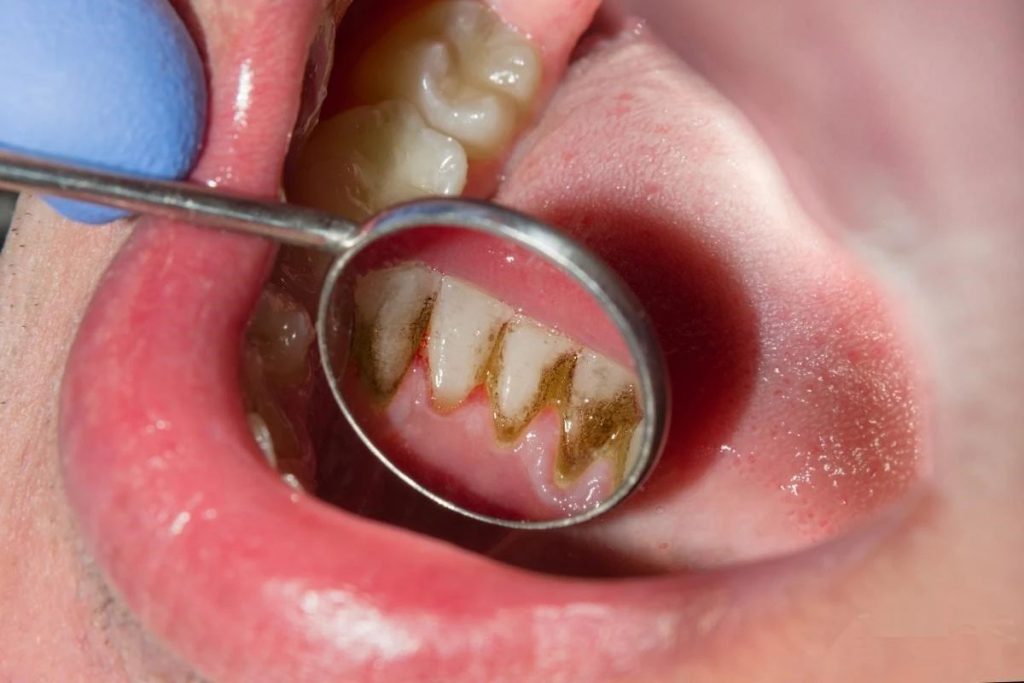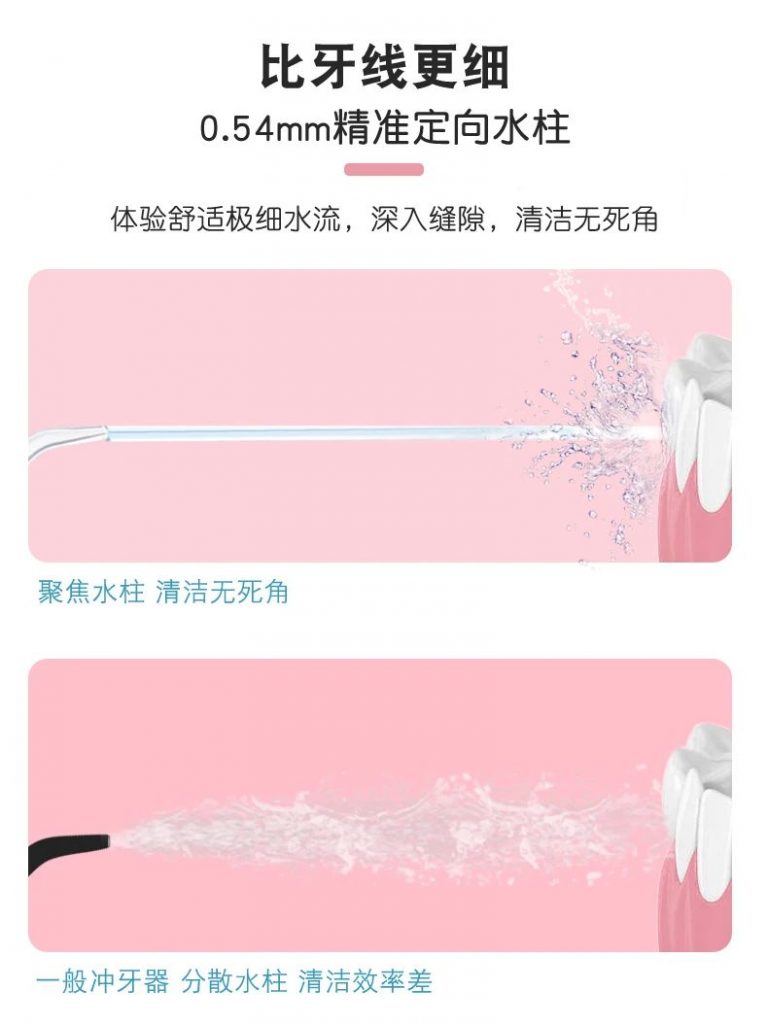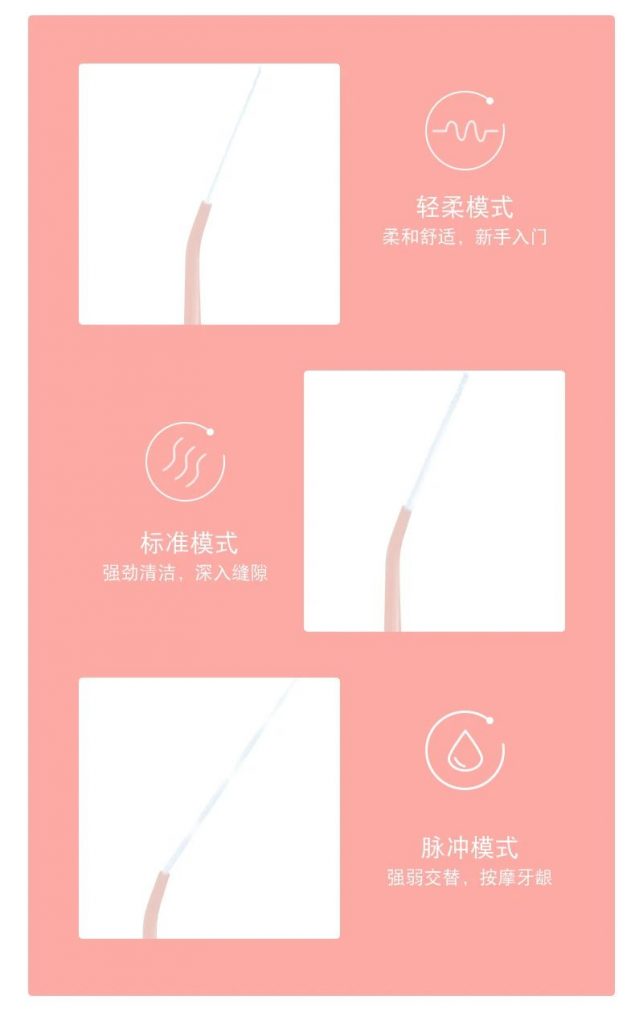I bought a water flosser
Shouldn’t it be necessary to go to the hospital for tooth cleaning?
If you have such thoughts
That’s a big mistake.
You may wonder
Isn’t flushing and cleaning teeth the same thing?
Of course not!

Water flossing ≠ Tooth washing
Water flossing and Tooth washing, whether in principle or function, are completely different things.
Water flossing
The so-called Water flossing generally refers to using water flosser cleaning tools to rinse the gaps between teeth after each meal, which individuals can independently complete. It is a daily way for individuals to clean the gaps between teeth.
At present, most of the water flossers on the market use pulse jet method, which uses the principle and function of pulse water flow to remove food residues in the gaps between teeth and flush the plaque on the surface of teeth.

Tooth washing!
Tooth washing, also known as supragingival scaling, is a preventive treatment for dental diseases that individuals cannot independently complete. It is necessary to go to a dental clinic and cooperate with professionals and professional equipment.
The most common way of cleaning teeth nowadays is “ultrasonic cleaning”. Its principle is to use an ultrasonic cleaning machine to remove bacteria, tartar, pigments, etc. from the tooth surface under ultrasonic vibration with a frequency of more than 20kHz, and polish the tooth surface to delay the re deposition of dental plaque and tartar.

It can be seen that the principles and functions of the Water flossing and the Tooth washing are different. The water flosser mainly cleans the residue and plaque between teeth, and cannot wash away dental calculus, but can delay the formation of new dental calculus; And the Tooth washing is mainly aimed at tartar, which is a deep cleaning of teeth and efficient prevention of dental problems.

This is because the stickiness of dental calculus is very stubborn, and the force of the water flosser cannot be compared to the force of the ultrasonic cleaner during tooth cleaning, so the water flosser cannot achieve the effect of cleaning dental calculus.
So, water flosser cannot replace Tooth washing.
Due to the stubborn stickiness of dental calculus, even if you buy a water flosser, brush your teeth and use it every day, you may still have dental calculus. Here, I suggests that each person clean their teeth once a year to keep their oral cavity relatively clean and safe. They can also take this opportunity to promptly check for issues such as dental caries~
Water flossing ≠ Toothwashing
Is it still necessary to buy a water flosser?
The answer to this question is obvious: it is necessary.let me tell you why you need it!
1. The gap between teeth is the gap between teeth, which is an area that cannot be touched by a toothbrush during daily brushing. Every day, debris and dental plaque accumulate between teeth, which requires us to use a water flosser to clean them in a timely manner to better care for the oral cavity and prevent dental caries.

2. Perhaps you might think that dental floss can also clean the gaps between teeth, but using dental floss is too troublesome and time-consuming. We don’t have enough time for daily work and rest, and many people may not be able to persist in using dental floss due to long and troublesome times. Water flosser is different, it is relatively mild and efficient, not to mention it is particularly convenient.

For example, this JIEYANG bigsmile mini Q portable water flosser has the best combination of functions: 1400 times/minute high frequency, 0.54mm concentrated fine water column, touch adjustable, and can use pulse high-pressure water flow to flush away residue and plaque in the gaps of teeth in just 2 minutes by closing the eyes and adjusting the impulse.

3. In addition, mouthwash cleaning is also effective, but compared to a water flosser, the cleaning power of mouthwash is too low. If you want some specific effects, such as sterilization, we ca also use a sterilized mouthwash together with a toothbrush to achieve better cleaning results.

It can be seen that water flosser are still very useful and necessary for our daily cleaning of teeth.
If you do a good job of daily oral hygiene, brush your teeth well every day, and use a water flosser and mouthwash after meals, it is actually enough to clean your teeth. The rate of tartar formation slows down, and the natural frequency of Tooth washing also decreases, and the probability of tooth decay also decreases. Isn’t this more practical than relying solely on tooth washing to maintain dental health?